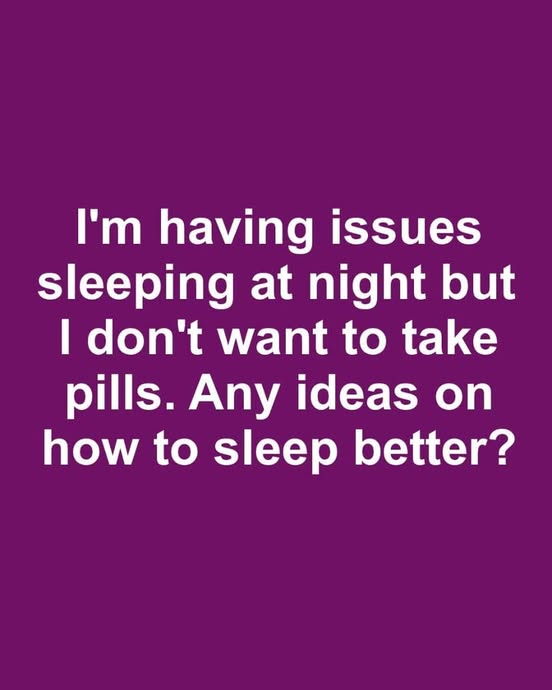
If you’re having a tough time falling asleep but don’t want to rely on medication, you’re not alone. Millions of people struggle with getting quality sleep, and many are looking for natural, drug-free solutions to help them rest better at night. Fortunately, there are plenty of proven strategies you can try that don’t involve reaching for a bottle of sleeping pills.
Whether your mind races at bedtime or you just can’t seem to unwind, small changes in your daily routine can make a huge difference in how well you sleep. Let’s break down some simple, effective ideas that can help you finally catch those much-needed Zzz’s—naturally.
1. Build a Consistent Sleep Routine
One of the most powerful ways to improve your sleep is to go to bed and wake up at the same time every day—even on weekends. Your body thrives on routine. A consistent schedule helps regulate your internal clock (also called your circadian rhythm), making it easier to fall asleep and wake up naturally without grogginess.
Try setting a regular bedtime and wake-up time, and stick to it as closely as possible. After a week or two, you’ll likely notice a real difference in how easily you drift off and how refreshed you feel in the morning.
2. Create a Relaxing Nighttime Environment
Your bedroom should feel like a calm, peaceful sanctuary—not an extension of your busy, stressful day. Pay attention to the lighting, temperature, and noise levels in your space.
Here are a few tips to create a sleep-friendly environment:
-
Keep your room cool: Experts recommend a bedroom temperature between 60-67°F (15-19°C) for optimal sleep.
-
Eliminate bright lights: Use blackout curtains if necessary, and minimize exposure to blue light from phones, TVs, and computers at least an hour before bed.
-
Reduce noise: Consider using a white noise machine, fan, or calming nature sounds if you live in a noisy area.
The goal is to make your bedroom a place your body and mind associate with rest and relaxation.
3. Limit Caffeine and Sugar Intake
It’s no secret that caffeine can interfere with your sleep—but many people don’t realize that even an afternoon coffee or energy drink can keep them wired well into the night.
Similarly, sugary foods can cause blood sugar spikes and crashes, which may disrupt your sleep cycles.
Try to limit caffeine after noon, and be mindful of how much sugar you’re eating in the evenings. Opt for herbal tea or warm milk if you need a comforting beverage before bed.
4. Try Natural Relaxation Techniques
If anxiety or stress keeps you awake at night, incorporating relaxation practices into your nightly routine can work wonders.
Some effective methods include:
-
Deep breathing exercises: Slow, mindful breathing can trigger your body’s natural relaxation response.
-
Progressive muscle relaxation: Gently tensing and then relaxing each muscle group can help release built-up tension.
-
Meditation and mindfulness: Guided meditations or simply focusing on your breath can quiet a racing mind.
Even just five to ten minutes of these practices before bed can help signal to your body that it’s time to wind down.
5. Get Some Natural Sunlight During the Day
Exposure to natural light during the day helps reinforce healthy sleep-wake patterns. Morning sunlight is especially important for keeping your circadian rhythm in check.
Try to get outside for at least 20–30 minutes each morning, whether it’s going for a walk, having your coffee on the patio, or simply sitting by a sunny window. If that’s not possible, consider using a light therapy box during darker months.
6. Move Your Body (But Not Too Late!)
Regular physical activity can help you fall asleep faster and enjoy deeper sleep. It doesn’t have to be intense—even moderate activities like walking, yoga, or stretching can make a big difference.
However, try to finish your workouts at least 3–4 hours before bedtime. Exercising too late in the evening can rev up your energy and make it harder to fall asleep.
7. Limit Naps (or Time Them Strategically)
While short naps can be a lifesaver on particularly exhausting days, long or poorly timed naps can throw off your nighttime sleep schedule.
If you need to nap, keep it under 30 minutes and try to do it earlier in the afternoon. That way, it won’t interfere with your ability to fall asleep later.
8. Watch What You Eat Before Bed
Heavy, spicy, or rich foods right before bedtime can cause discomfort, indigestion, and even heartburn, making it tough to fall asleep.
Aim to finish eating dinner at least two to three hours before bedtime. If you need a snack later, choose something light and sleep-friendly, like a banana, a handful of almonds, or a small bowl of oatmeal.
9. Try Calming Scents and Sounds
Aromatherapy can be a powerful tool for relaxation. Scents like lavender, chamomile, and sandalwood are known to promote calmness and support sleep.
You might also enjoy soft, calming music, white noise, or nature sounds to help create a more soothing environment. Experiment to find what works best for you.
Final Thoughts: Small Changes, Big Results
Struggling with sleep doesn’t mean you have to jump straight to medication. Sometimes, small changes to your habits and environment can have a surprisingly big impact.
By being intentional about your sleep hygiene, daily routines, and relaxation practices, you can set yourself up for restful, rejuvenating sleep—all without pills.
Remember: better sleep starts with better habits. Start small, stay consistent, and give your body the tools it needs to do what it’s designed to do—rest, recharge, and restore.





